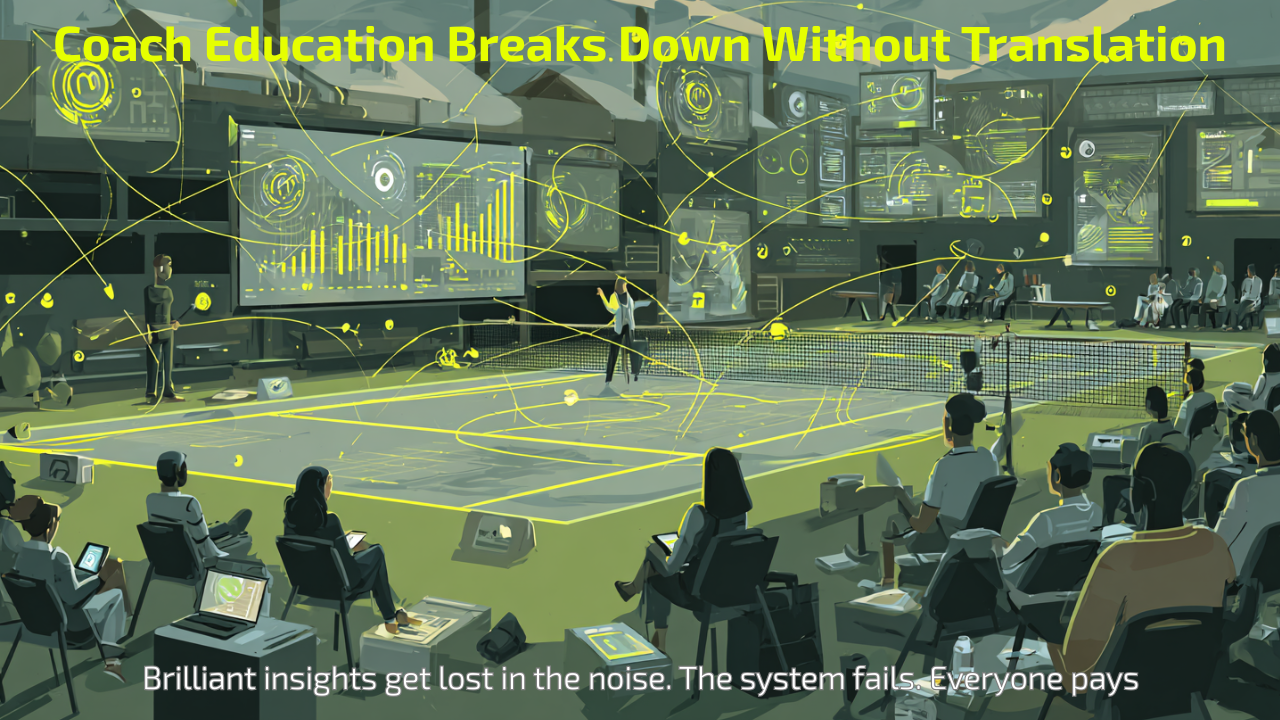When Coach Education Fails, Everyone Loses
Oct 02, 2025
Tennis directors across America are convinced they have a coach attitude problem. They're wrong.
You see the same scene at every facility: coaches sitting in mandatory training sessions with arms crossed, checking phones, asking "Why do we have to do this again?" You respond with "Because it's required" or "Because I said so." Everyone goes through the motions, signs attendance sheets, and nothing changes on court.
You assume resistant coaches are just being difficult. But what if the problem isn't coach attitude at all? What if it's about translation - delivering the same expertise in learning languages that match how different minds naturally process information?
The Pattern Nobody Recognizes
I've spent 35 years watching this same cycle repeat across dozens of facilities. At one academy, three highly qualified coaches quit within a year after repeated training sessions that felt like indoctrination rather than development. In each case, brilliant tennis insights from directors hit a wall when trying to transfer that knowledge to coaching staff.
Sound familiar? It should.
It's the exact same communication breakdown I discovered working with elite junior players. The same pattern that cost months of development time with accomplished athletes who resisted tactical adjustments that could have elevated their games to the next level.
Here's what I learned: When proven expertise can't find the right delivery mode for each learner, everyone suffers. The expertise gets wasted. The learner gets frustrated. And development stalls.
We solved this problem for player development by creating communication translation systems. Now I'm watching the same communication failures destroy coach education programs across the industry.
The Real Cost of Failed Coach Education
When coach education fails, it destroys program credibility and wastes everyone's time and money:
Players receive inconsistent instruction. Coaches who don't absorb training insights fall back on outdated methods or personal preferences, guaranteeing conflicting fundamentals across your program.
Parents lose confidence in your program. Nothing kills credibility faster than watching different coaches teach contradictory tactical concepts.
Precious resources get wasted. Time, money, and expertise invested in training sessions that produce zero behavioral change on court.
Good coaches leave. Quality instructors get frustrated when forced to sit through training that doesn't connect with how they process information.
Your program plateaus. Without effective knowledge transfer, you can't evolve beyond your personal capacity to teach everyone individually.
But here's the part that keeps me up at night: we know how to fix this.
The Communication Translation Framework Applied to Coach Education
The solution isn't creating better training content. You already have solid technical and tactical knowledge.
The solution is translating that expertise into different learning languages.
Some coaches need step-by-step technical breakdowns with biomechanical explanations before they'll implement new teaching methods. Others respond to big-picture strategic concepts and "trust the process" guidance. Still others require seeing measurable results from pilot programs before embracing changes.
Traditional approach: You explain new teaching method → Some coaches implement → Others resist → Frustration → "Because I said so" → Compliance without understanding
Translation approach: Your insight → Assessment of coach learning preferences → Multiple delivery formats → Understanding → Implementation
What This Looks Like in Practice
Instead of one training session covering tactical intention development, imagine three parallel approaches:
For analytical coaches: Data-driven breakdown showing how tactical intention training improves player decision-making metrics over 6-week periods, with specific measurement protocols.
For intuitive coaches: Conceptual framework showing how tactical intention connects to overall player development philosophy, with flexibility for individual coaching style adaptation.
For practical coaches: Step-by-step implementation guide with specific drills, common problems, and troubleshooting strategies tested across different age groups.
The Technology Already Exists
We have AI-driven assessment tools that can identify learning preferences. We have systems that can generate multiple formats for the same content. We have platforms that can deliver personalized learning paths.
The technology isn't the barrier. The barrier is recognizing that coaching expertise without communication translation is like having a brilliant book written in a language your audience can't read.
The Questions That Actually Matter
How many tennis programs are operating below their potential because you can't effectively transfer your knowledge to coaching staff?
How much faster could your junior players develop if your entire coaching team implemented systematic approaches rather than individual preferences?
The Systematic Solution
The framework exists. Communication preference assessment, content translation protocols, delivery format customization, and implementation tracking systems.
We've proven this works for player development. The same principles apply to coach education.
The question isn't whether we can solve failed coach education. The question is whether you're willing to stop accepting communication failures as inevitable and start thinking systematically about knowledge transfer.
Because when coach education fails, everyone loses. Your expertise gets wasted. Your coaches feel disrespected. Your players receive inconsistent instruction. And parents question whether they've chosen the right program.
But when coach education succeeds through proper communication translation, everyone wins. You see your insights implemented systematically. Your coaches feel respected and competent. Your players receive consistent, high-quality instruction. And your program can scale beyond your individual capacity.
What will your program look like a year from now if your training still produces compliance theater instead of change? You can keep running the same failed training sessions and expecting different results. Or you can apply communication translation principles and actually solve this problem.
Not just for tennis. For every sport where expert knowledge needs to transfer effectively to teaching staff who learn differently.
Never Miss a Moment
Join the mailing list to ensure you stay up to date on all things real.
I hate SPAM too. I'll never sell your information.
